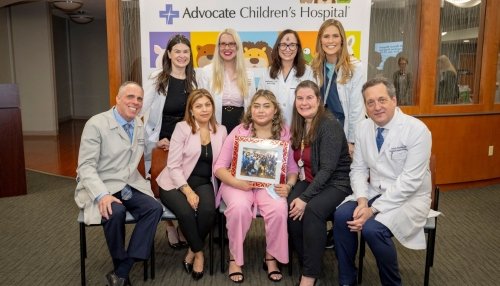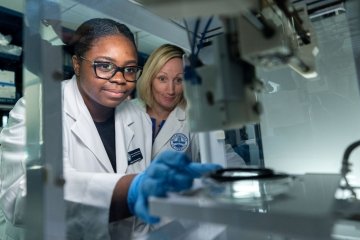Healing Hearts: Midwestern Alum Part of Historic Pediatric Transplant Team
Clinical Psychologist Gabrielle Sanchez Provides Emotional Support to Young Heart Patients

Nataly Paramó (front, center), the first pediatric heart transplant recipient at Advocate Children’s Hospital, sits at a press conference with her mother and members of her healthcare team, including Dr. Sanchez (back row, second from left), a Midwestern University Clinical Psychology graduate. (photo courtesy of Advocate Children’s Hospital).
The cameras flashed, the reporters leaned in, and at the center of it all was 15-year-old Nataly Paramó, now a part of Advocate Children’s Hospital history. Just months earlier, she had been the first pediatric patient to receive a heart transplant at the hospital in Oak Lawn, IL, a milestone several years in the making. The press conference, held in March 2025, was a celebration, but the journey that brought her there had been anything but simple.
Among those who guided Nataly through the emotional terrain of being diagnosed with heart failure as a child and who continue to support her in the new realities of life as a transplant recipient is clinical psychologist Gabrielle Sanchez, Psy.D., a Midwestern University graduate (CHS-Downers Grove, Clin Psych ’23).
MWU Clinical Psychology Graduate Essential Part of Transplant Team
As a clinical psychologist, Dr. Sanchez helps young transplant patients like Nataly navigate the emotional and psychological weight of their new reality. “While pediatric heart transplantation extends a child’s life, it also introduces a lifelong medical journey,” she says. “These patients no longer have heart failure, but they will require lifelong medications, medical follow-ups, and the possibility of needing another transplant later in life. This reality significantly shapes their social and emotional development.”
Dr. Sanchez’s path to her work as a Pediatric Heart Transplant/HF Psychologist began at Midwestern University, where she was drawn to the University’s strong focus on interdisciplinary education. “Midwestern is unique in that regard,” she explains. “The entire campus is dedicated to healthcare, which provides countless opportunities to collaborate with students across various healthcare disciplines. This environment fostered an early understanding of how different specialties work together—a skillset that has been invaluable in my career.”
Today, Dr. Sanchez works alongside cardiologists, intensivists, surgeons, nurses, dietitians, and social workers, all cooperating to provide comprehensive care. “Communication, collaboration, flexibility, and humility are crucial in this work,” she says. “Midwestern prepared me for this by immersing me in a culture where these qualities were not just encouraged but expected. I’m one part of a larger team, and we each bring something essential to the table.”
Building Advocate Children's Pediatric Transplant Program

When Dr. Sanchez joined Advocate Children’s in the summer of 2024, the transplant program was in its infancy. “We were hopeful just to list one patient for transplant by the end of the year,” she recalls. “By New Year’s, we had already completed three.”
Despite the program’s youth, it has grown rapidly, drawing mentorship from Advocate’s well-established adult transplant team. However, pediatric transplant psychology presents unique challenges. “In adult transplant programs, we focus a lot on candidacy and whether a patient is a good fit for the procedure,” she explains. “With kids, it’s about identifying strengths. How do we set them up for success? I work with the child and their caregivers to develop strategies to both motivate and empower them to actively participate in their care.”
That means assessing a child’s emotional and cognitive development, understanding their family dynamics, and identifying potential roadblocks including needle phobia, anxiety, and medication adherence “As a psychologist, my goal is to ensure that despite the medical setbacks these kids face, they're still able to live their lives with their new heart and pursue their academic, vocational, and social goals," Dr. Sanchez explains. "I assist them in adjusting to lifestyle changes and processing the emotions that arise throughout their journey."
Her passion for pediatric health psychology took root early. “I’ve always wanted to help children fulfill their ideal lives despite their health challenges,” she says. “Pediatric health psychology focuses on the relationship between physical and mental health—how medical conditions can impact social, emotional, and cognitive development.”
During her residency and fellowship years, she gained experience across diverse pediatric specialties, including endocrinology, neurology, and cardiology. “What I found most rewarding was the opportunity for interdisciplinary collaboration,” she says. “Partnering with healthcare professionals to support children beyond their medical conditions, while also understanding how chronic illnesses impact the entire family unit.”
Integrating Psychology and Medicine for Better Outcomes
As the transplant program continues to grow at Advocate Children’s Hospital, Dr. Sanchez remains committed to advancing both the psychological and medical dimensions of pediatric care. “Health psychology is still a relatively new field,” she notes. “But there’s a growing body of research supporting the clinical benefits of having a dedicated psychologist within a healthcare organization. It’s beneficial for patients to receive all their care in one setting, and it’s invaluable for staff to collaborate seamlessly as a team.”
Dr. Sanchez recalls the pivotal moment when the transplant team received news of a potential donor for Nataly. "We all walked as a team to her room and delivered the news to the family. It was a very emotional moment for both the family and our team. That’s something I don't think I'll ever forget in my career. Midwestern University gave me the skills and confidence to thrive in hospital-based care and support pediatric patients and their families."
For Nataly Paramó and future heart transplant patients, Advocate Children's Hospital's integrated care model offers a renewed lease on life. "Transplant, I think, is a very hopeful area in medicine,” Dr. Sanchez says. “It was very rewarding for me to be part of that experience and to be a valued member of this team – where my role as a psychologist was not only recognized but deeply integrated into the patient's care.”



